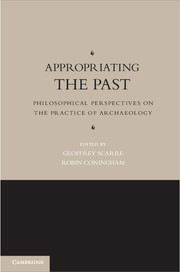Book contents
- Frontmatter
- Contents
- Contributors
- Editors
- Chapter 1 Introduction
- Part One Claiming the Past
- Chapter 2 The Values of the Past
- Chapter 3 Whose Past? Archaeological Knowledge, Community Knowledge, and the Embracing of Conflict
- Chapter 4 The Past People Want
- Chapter 5 The Ethics of Repatriation
- Chapter 6 On Archaeological Ethics and Letting Go
- Chapter 7 Hintang and the Dilemma of Benevolence
- Part Two Problems of Meaning and Method
- Part Three Problems of Ownership and Control
- References
- Index
Chapter 2 - The Values of the Past
Published online by Cambridge University Press: 05 December 2012
- Frontmatter
- Contents
- Contributors
- Editors
- Chapter 1 Introduction
- Part One Claiming the Past
- Chapter 2 The Values of the Past
- Chapter 3 Whose Past? Archaeological Knowledge, Community Knowledge, and the Embracing of Conflict
- Chapter 4 The Past People Want
- Chapter 5 The Ethics of Repatriation
- Chapter 6 On Archaeological Ethics and Letting Go
- Chapter 7 Hintang and the Dilemma of Benevolence
- Part Two Problems of Meaning and Method
- Part Three Problems of Ownership and Control
- References
- Index
Summary
Questions about ownership of archaeological finds are often framed as questions about rights. Archaeologists claim to have a right to engage in scientific inquiry, a right that authorizes them to appropriate (at least some) finds. Indigenous people in the Americas, Australasia, and elsewhere often maintain that they have inherited a right to ownership of the finds associated with their cultures. Similarly, nations claim that they have a right to certain artifacts. We also hear that all of humanity has a right to certain archaeological discoveries. It is often difficult to discover the bases of these supposed rights to own or appropriate finds and even harder to weigh competing claims based on claims to rights. Consequently, rights-based debates have not been particularly successful in resolving questions about the ownership and appropriation of archaeological finds. In the hope of better results, I suggest that we ask about the various sorts of value that finds have and for whom. My hope is that once it becomes apparent that a particular find has great value for some group of people (and less for others), questions about possession and appropriation of the find will become more malleable. Because a universal account of how and to whom archaeological finds are valuable is likely to prove elusive, we should not expect reflection on the value of finds to result in general principles about ownership and appropriation. We can, however, hope for a methodology that will help resolve questions about ownership in a wide range of cases. This chapter takes some steps toward developing this methodology.
- Type
- Chapter
- Information
- Appropriating the PastPhilosophical Perspectives on the Practice of Archaeology, pp. 25 - 41Publisher: Cambridge University PressPrint publication year: 2012



